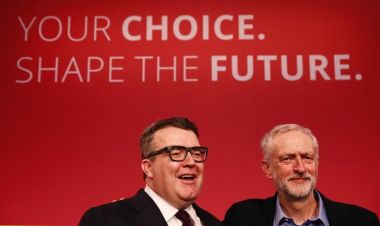Labour divisions exposed after Corbyn leadership victory

Britain's opposition Labour Party must unite behind new leader Jeremy Corbyn, his deputy said on Sunday as he revealed his own differences with his new boss over issues such as defence and foreign policy.
Left-wing veteran Corbyn won the support of 59.5 per cent of members and supporters but he has far less backing among Labour MPs, with several saying that the party cannot win the next election in 2020 if it lurches left.
"I understand the concern of my colleagues in parliament, this is a huge change for the party, there is no point in denying this a huge political realignment too but Jeremy Corbyn has got a huge mandate from our members," Tom Watson, who was elected deputy leader on Saturday, told the BBC.
"I say to my colleagues watch this space, respect the mandate that he has been given from our members, try and unify."
Watson said there was "zero chance" of a coup against Corbyn but acknowledged there were differences to overcome on policy, which he said could be put to the vote of Labour members.
At odds with the existing Labour position, anti-war campaigner Corbyn opposes the renewal of Britain's Trident nuclear-armed submarine programme and has advocated withdrawing from the NATO military alliance.
"I need to be honest about where I stand on things, I think NATO has kept the peace in Europe for half a century," Watson said, adding that he did not believe most members had backed Corbyn solely for his views on NATO.
"I aim to convince him of the merits of NATO...These things have got to be worked out."
Watson, who backs the renewal of Trident, also said he would definitely be supporting Britain staying in the European Union at a referendum due by the end of 2017.
The rise of Corbyn, who voted 'No' to Europe in a 1975 referendum and has been ambiguous about how he plans to campaign in the upcoming vote, has raised fears among some British pro-Europeans that he will scupper the hopes of drawing out millions of Labour voters in support of the EU.
Wrong leader
Prime Minister David Cameron's Conservatives have quickly sought to play on Corbyn's foreign policy views, saying he is a risk to Britain's security and highlighting his past meetings with Palestinian militant group Hamas and Lebanese Shi'ite Muslim group Hezbollah – something Corbyn has defended in the interest of gathering a wide range of views.
Hamas and the military wing of Hezbollah are both officially designated as terrorist organisations by Britain.
"Unlike Corbyn, the mainstream Labour Party does not believe in ducking our international responsibilities, it would never offer succour to terrorist groups," Labour lawmaker John Mann wrote in the Mail on Sunday newspaper.
Mann warned if Labour achieved success at local and regional elections in May next year under Corbyn he would have earned the right to lead the party into the 2020 national election.
"But if he fails to do that, my party must act," he wrote. "We cannot...sit on our hands once more if it turns out that we have indeed elected the wrong leader."
Corbyn told the Observer newspaper he had a "huge mandate" and members and supporters would expect Labour MPs to cooperate with him but Britain's mainly right-wing press was dominated by warnings over the party's future.
The Mail on Sunday declared the party "Red and buried" while the Sunday Times front page said Corbyn had sparked a civil war.
A Survation poll for the Mail carried out after Saturday's result found 44 per cent of the 1,031 people surveyed believed Cameron would make the best prime minister, compared to 27 per cent for Corbyn. Asked whether Labour would lose the next two national elections, 39 per cent said yes and 22 per cent no.
Former Labour minister Peter Mandelson said the party had taken a "leap backwards".
"We may not see an immediate, dramatic collapse. Many voters may even be attracted initially by Corbyn's populism and anti-establishment pitch. But that is not the same as deciding he should be Britain's next prime minister," he wrote in the Times.
"The danger is that Labour simply decides to muddle through, resigning ourselves to our fate rather than doing anything big enough to alter it."











